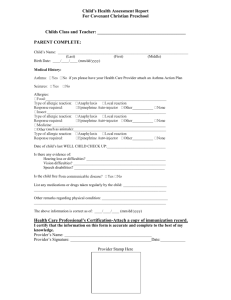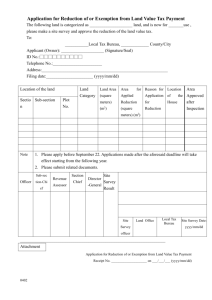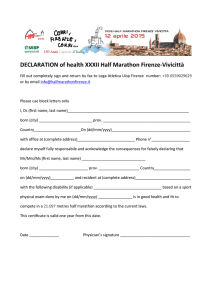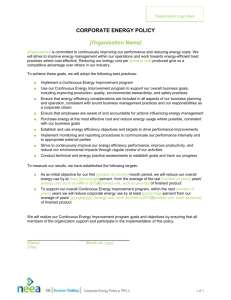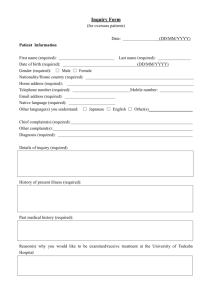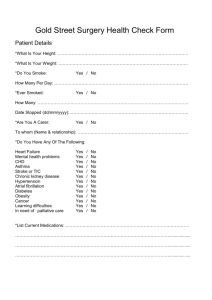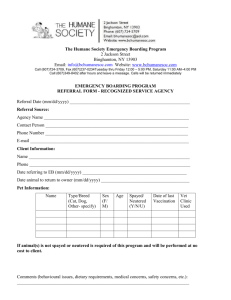Questionnaire - Royal College of Paediatrics and Child Health
advertisement
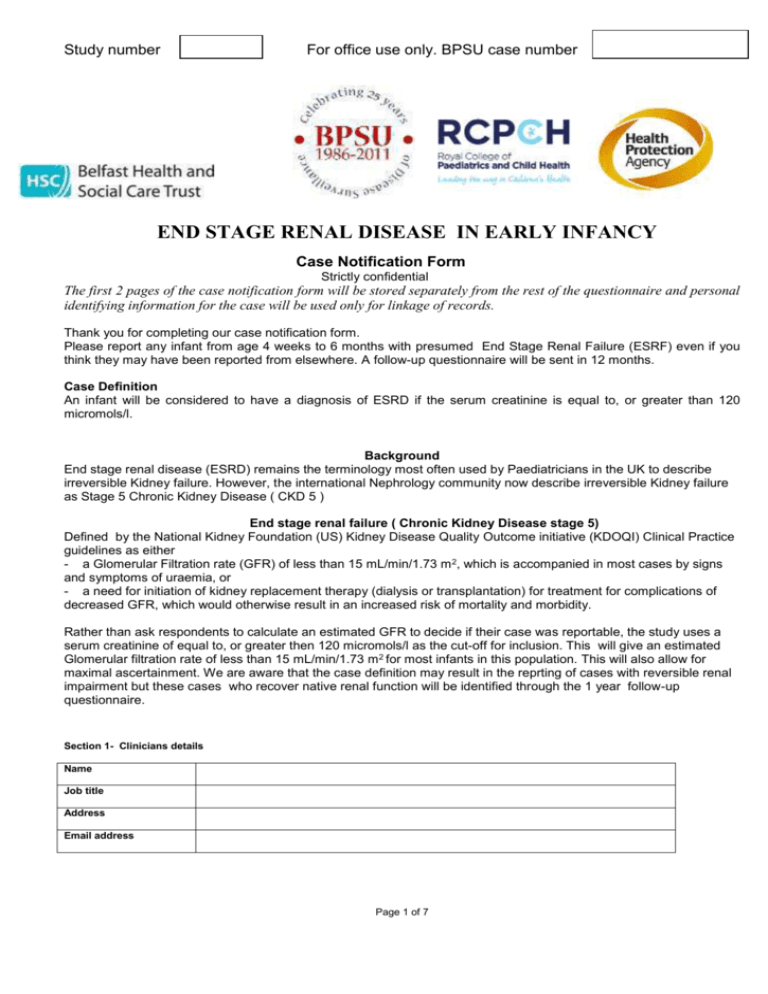
Study number For office use only. BPSU case number END STAGE RENAL DISEASE IN EARLY INFANCY Case Notification Form Strictly confidential The first 2 pages of the case notification form will be stored separately from the rest of the questionnaire and personal identifying information for the case will be used only for linkage of records. Thank you for completing our case notification form. Please report any infant from age 4 weeks to 6 months with presumed End Stage Renal Failure (ESRF) even if you think they may have been reported from elsewhere. A follow-up questionnaire will be sent in 12 months. Case Definition An infant will be considered to have a diagnosis of ESRD if the serum creatinine is equal to, or greater than 120 micromols/l. Background End stage renal disease (ESRD) remains the terminology most often used by Paediatricians in the UK to describe irreversible Kidney failure. However, the international Nephrology community now describe irreversible Kidney failure as Stage 5 Chronic Kidney Disease ( CKD 5 ) End stage renal failure ( Chronic Kidney Disease stage 5) Defined by the National Kidney Foundation (US) Kidney Disease Quality Outcome initiative (KDOQI) Clinical Practice guidelines as either - a Glomerular Filtration rate (GFR) of less than 15 mL/min/1.73 m 2, which is accompanied in most cases by signs and symptoms of uraemia, or - a need for initiation of kidney replacement therapy (dialysis or transplantation) for treatment for complications of decreased GFR, which would otherwise result in an increased risk of mortality and morbidity. Rather than ask respondents to calculate an estimated GFR to decide if their case was reportable, the study uses a serum creatinine of equal to, or greater then 120 micromols/l as the cut-off for inclusion. This will give an estimated Glomerular filtration rate of less than 15 mL/min/1.73 m 2 for most infants in this population. This will also allow for maximal ascertainment. We are aware that the case definition may result in the reprting of cases with reversible renal impairment but these cases who recover native renal function will be identified through the 1 year follow-up questionnaire. Section 1- Clinicians details Name Job title Address Email address Page 1 of 7 Study number For office use only. BPSU case number Consultant name Job title Delete as appropriate Email address Nephrologist / Neonatologist / General Paediatrician D D Date of Completion M M Y Y Y Y Y Y Y Y Section 2- Child’s details 2.1 BPSU I.D 2.2 Hospital number 2.3 NHS number 2.4 DOB D 222 2.42222 2.5 D M M Birth gestation ( in completed weeks ) 2.6 Sex MALE 2.7 FEMALE Birth weight ( Kg) ● 2.8 Home postcode at birth First part only 2.9 County of birth If born in Irish Republic 2.10 Ethnicity Enter tick in relevant box i.White? British Other white background Please describe ii.Mixed race ? White & Black Caribbean White & Black African White & Asian Other mixed background. Please describe iii.Asian or Asian British? Indian Pakistani Bangladeshi Other Asian background Please describe iv. Black or Black British? Caribbean African Other black background Please describe v.Chinese or Other ethnic group Chinese Any other Please describe Study number Section 3- 3.1 For office use only. BPSU case number Mode of presentation When was the diagnosis of ESRD made? D D M M Y Y DefinitionPresumed irreversible renal failure with a serum creatinine of greater than, or equal to 120 micromol/l 3.2 What was the Serum Creatinine at diagnosis? ( umol/l) 3.3 Weight at diagnosis ( kg) ● 3.4 3.5 Length at diagnosis (cm) What was the primary renal diagnosis? Please tick the appropriate box(es) Renal dysplasia Obstructive uropathy Congential nephropathies Please describe Please describe Renal cystic disease Prune belly syndrome Renal Vein thrombosis Wilm’s tumour Other Please describe Diagnosis not yet known 3.6 Was the primary diagnosis made ante-natally? If Yes, please state the diagnosis made What was the gestational age at diagnosis? in completed weeks Was foetal intervention performed? If yes, please describe Y N Not known Y N Not known Y Y Study number Section 4 4.1 For office use only. BPSU case number Management following the diagnosis of ESRD Y Was the patient referred to a Paediatric Nephrologist? N If yes, please complete the following Name of NephrologistHospital- 4.2 ________________________ _____________________ Please tick all treatments used and major changes subsequent to the diagnosis of ESRD? Please tick the appropriate box & enter the date of commencement. If the same treatment was used more than once, please enter the information in column 2 of the appropriate section. 1 2 Conservative management (Pre-dialysis) DD MM YYYY DD MM YYYY Peritoneal Dialysis DD MM YYYY DD MM YYYY Haemodialysis DD MM YYYY DD MM YYYY Palliative care DD MM YYYY DD MM YYYY Recovered native renal function DD MM YYYY DD MM YYYY Renal transplantation DD MM YYYY DD MM YYYY 4.3 If the patient is deceased, please state the date and cause of death Date of death DD MM YYYY Cause of death Section 5- Additional medical problems Has the child ever had any of the following? If so, please provide details. Details 5.1 Urinary Tract Infection Y N 5.2 Hypertension Y N 5.3 Congenital Heart Disease Y N 5.4 Other Cardiovascular Disease Y N 5.5 Chronic Lung Disease Y N 5.6 Other Respiratory Disease Y N 5.7 Liver Disease Y N 5.8 Gastro-intestinal Disease Y N 5.9 Cerebral haemorrhage Y N 5.10 Seizures Y N Don’t know Don’t know Don’t know Don’t know Don’t know Don’t know Don’t know Don’t know Don’t know Study number For office use only. BPSU case number 5.11 Visual impairment Y N Don’t know 5.12 Hearing impairment Y N Don’t know 5.13 Hypoxic-ischaemic Encephalopathy Y N Don’t know 5.14 Other Neurological disease Y N 5.15 Other, please give details Y N Don’t know Don’t know 5.16 Does the child have any syndromic abnormalities? 5.17 Y N Don’t know Nutrition. Please indicate which of the following feeding modalities have been used and state which is the current method of feeding. Y N Naso-gastric/Naso-jejunal feeds (NG/NJ) i. ii. iii. iv. v. Gastrostomy feeds ( GF) Total Parenteral nutrition (TPN) Y N Y N How is the patient currently fed ? Please tick box Oral NG/NJ GF Section 6- Surgical history 6.1 Please tick the appropriate box to describe the patient’s surgical history 6.1.1 Has the child had surgery? Y N Not known If Yes, please answer Questions 6.1.2 to 6.1.4 6.1.2 Surgical procedures Please detail the patient’s surgical history Procedure Yes? No? Not Known? Date(s) of Procedure(s) Access surgery DD MM YYYY Insertion of Peritoneal dialysis ( PD) catheter Insertion of Central venous catheter (CVC) DD MM YYYY Removal of PD catheter DD MM YYYY Removal of CVC DD MM YYYY TPN Study number For office use only. BPSU case number Insertion of Gastrostomy DD MM YYYY Urology DD MM YYYY Insertion of Nephrostomy Partial Nephrectomy DD MM YYYY Complete Nephrectomy DD MM YYYY Nephroureteretomy DD MM YYYY Fashioning of Cystostomy/ Vesicotomy DD MM YYYY Insertion of supra-pubic catheter DD MM YYYY Other Surgeryplease give details DD MM YYYY DD MM YYYY DD MM YYYY Thank you for completing this questionnaire Karl McKeever Consultant Paediatric Nephrologist Royal Belfast Hospital for Sick Children The Royal Hospitals Belfast Health and Social Care Trust Falls Rd Belfast BT12 6BE Tel 02890630012 Secretary 02890632694 karl.mckeever@belfasttrust.hscni.net
